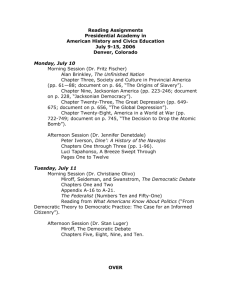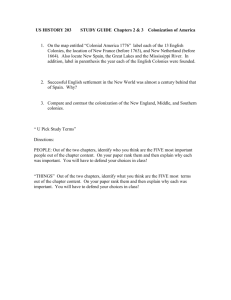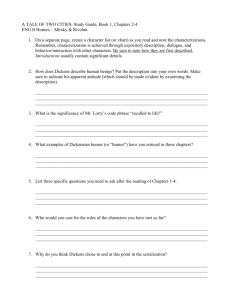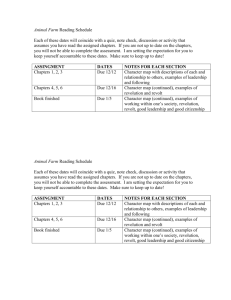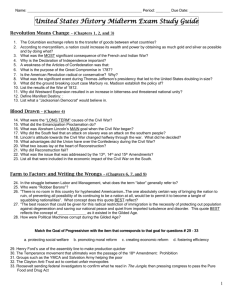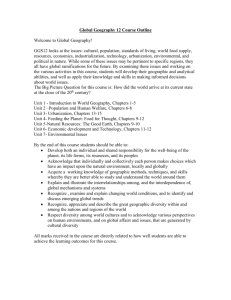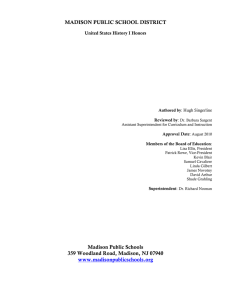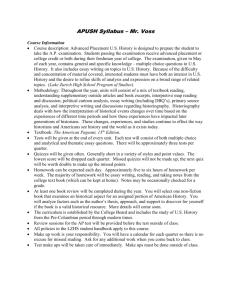HISTORY 1A ESSAY QUESTIONS: SPRING 2010 Please select and
advertisement
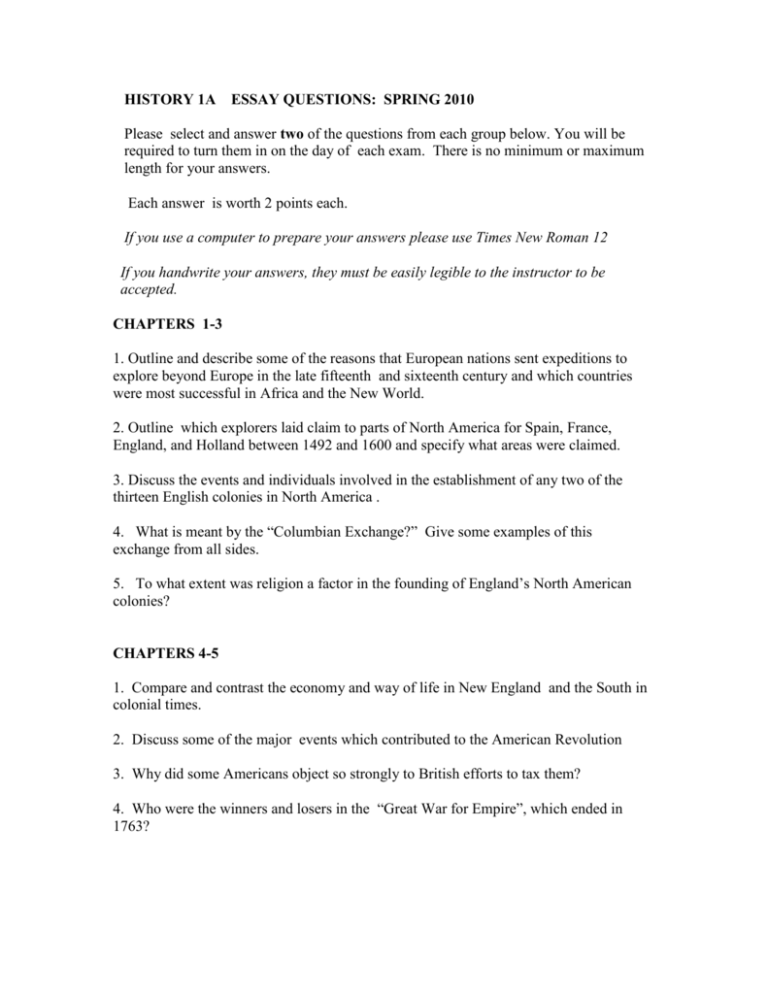
HISTORY 1A ESSAY QUESTIONS: SPRING 2010 Please select and answer two of the questions from each group below. You will be required to turn them in on the day of each exam. There is no minimum or maximum length for your answers. Each answer is worth 2 points each. If you use a computer to prepare your answers please use Times New Roman 12 If you handwrite your answers, they must be easily legible to the instructor to be accepted. CHAPTERS 1-3 1. Outline and describe some of the reasons that European nations sent expeditions to explore beyond Europe in the late fifteenth and sixteenth century and which countries were most successful in Africa and the New World. 2. Outline which explorers laid claim to parts of North America for Spain, France, England, and Holland between 1492 and 1600 and specify what areas were claimed. 3. Discuss the events and individuals involved in the establishment of any two of the thirteen English colonies in North America . 4. What is meant by the “Columbian Exchange?” Give some examples of this exchange from all sides. 5. To what extent was religion a factor in the founding of England’s North American colonies? CHAPTERS 4-5 1. Compare and contrast the economy and way of life in New England and the South in colonial times. 2. Discuss some of the major events which contributed to the American Revolution 3. Why did some Americans object so strongly to British efforts to tax them? 4. Who were the winners and losers in the “Great War for Empire”, which ended in 1763? CHAPTERS 6-7 1. Discuss why the Constitution replaced the Articles of Confederation and outline some of the major compromises that were needed to ensure its passage. 2. Discuss the importance of at least three major battles of the American Revolution. 3. Evaluate in order of importance three major reasons why the Americans won the American Revolution. 4. What were the views of Federalists and Anti-Federalists on the type of government that would be best for the new nation? CHAPTERS 8-9 1. Compare and contrast the political views of the Federalists and Democratic Republicans during the period from 1790-1800. 2. To what extent did foreign relations shape politics in the early republic between 1790 and 1815? 3. How did the conflict with Britain leading up to the War of 1812 –and the war itself-divide America? 4. Was the War of 1812 an American victory, an American defeat, or something else? CHAPTERS 10-11 1. Discuss American attitudes and actions in dealing with Indian tribes east of the Mississippi during the period from 1800-1840. 2. Discuss the presidency of Andrew Jackson and his position on such issues as banking and the treatment of Indians. What groups did he champion and what were the groups (and regions) where opposition to his policies was strongest? 3. What was the Nullification crisis and why was it important? 4. Discuss the transportation revolution in the United States in the early nineteenth century. CHAPTERS 12-13 1. Discuss the emerging social reform movements of the period from 1820 to 1860 and who its leaders and supporters were. How successful were they during this period in bringing about the changes they sought? 2. Discuss how the United States expanded its territory during the 1840’s. Be sure and cite at least two different historical events which took placed during this decade. 3. Discuss the Compromise of 1850 and whether or not it reflected a true compromise between the nation’s regions? Did it solve the problems that it hoped to? 4. What was the Dred Scott case and why was it so destructive for national unity? 5. Why did the Whig party collapse during the 1850’s and the Democratic party split apart? CHAPTERS 14-15 1.What are some of the main reasons that the North won the Civil War? 2. What were the three most decisive battles of the Civil War and why were they important? 3. What role did slavery and African-Americans play in the diplomatic outcome of the war and on the actual battlefield? 4. To what extent is it fair to say that Reconstruction was a failure? To what extent could it be considered a success? 5. What roles did the Republican and Democratic parties play in the implementation and outcomes of Reconstruction?

